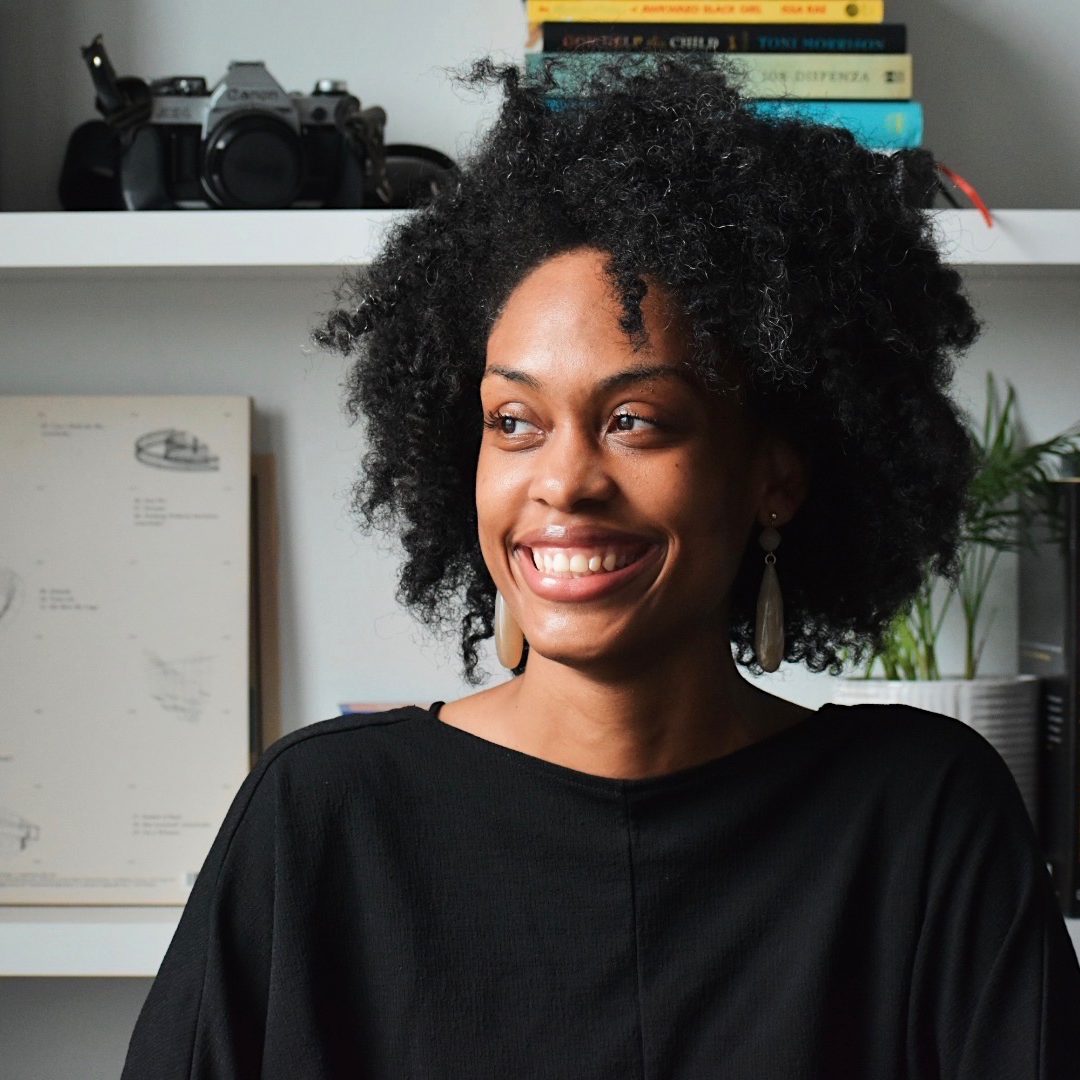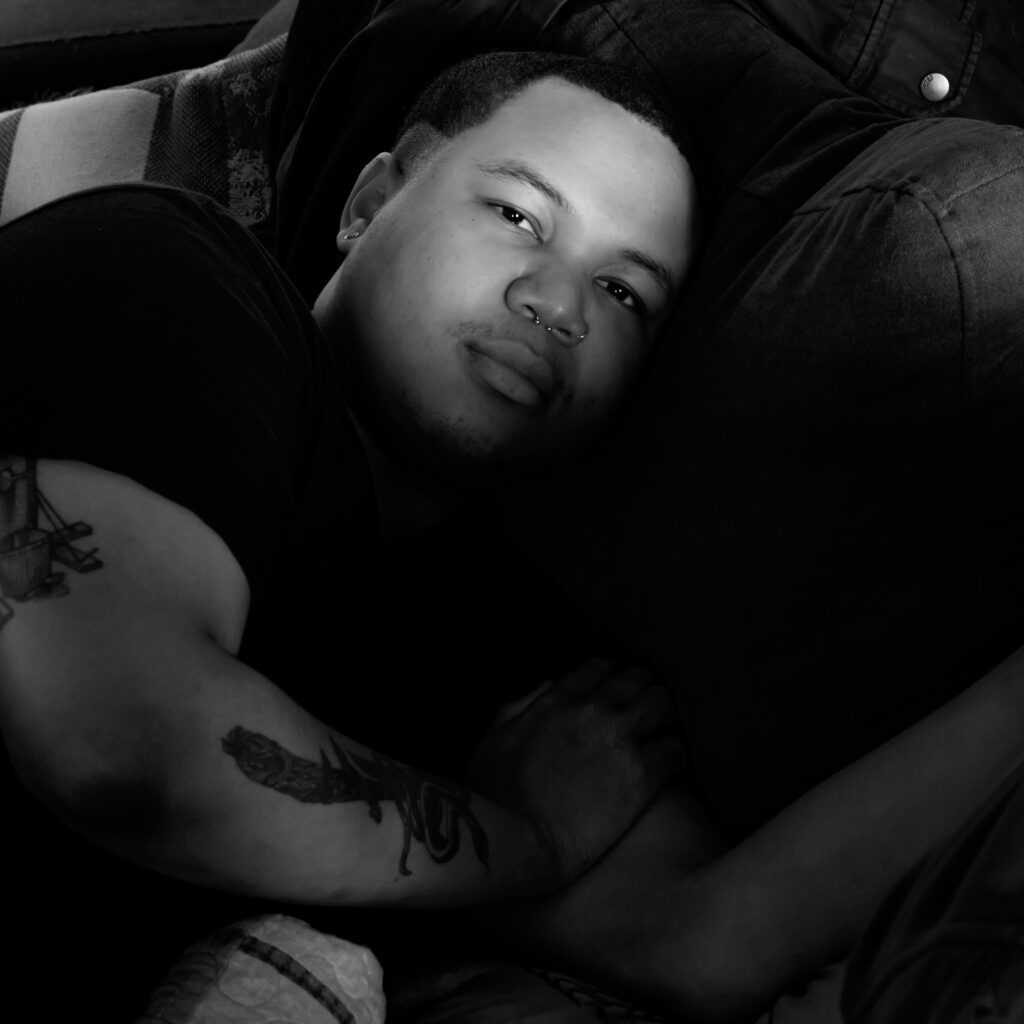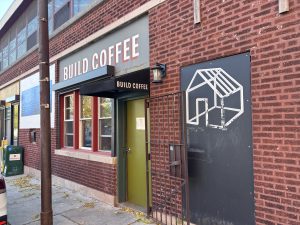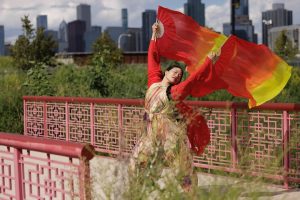This article was developed and written as part of Muña, an art writing program providing a cohort of six writers the opportunity to critically and creatively engage with art writing strategies, readings, exercises, and conversations. The program is structured for writers to develop and refine their practices through guided workshops and peer-review feedback. Its task is to stir, incubate, and pollinate shared consciousness on holistic, equitable, and attentive art writing and language practices. Muña is a program collaboration by Chuquimarca and Sixty Inches From Center.

The ancient Greek poet Sappho wrote, “Than the lyre, far sweeter in tone, than gold, more golden,”1 as a reflection of the art of song. Sappho was known for her fusion of poetry and lyric which felt innovative, yet alluring, dreamy, and deeply personal. Because of her pioneering form of creativity, Sappho was considered by Plato as the Tenth Muse. In Greek mythology the Muses were a group of goddesses who were entrusted as protectors of the arts, leading the Greek through a creative renaissance and inspiring others to explore the innermost artistic pieces of themselves. I’ve found that many individuals carry the spirit of the ancient goddesses in how they move through the art world, BSA Gold being one of them. Barédu Ahmed, who performs under the name BSA Gold, is an electronic soul musician whose work takes listeners on a journey through space, sound, spirituality, and self. She’s released two albums — Saturn Return and Tone Poems For Mysterious Times — both of which transport listeners to a different world. Her love for music has also ignited a desire in her to create and support spaces that promote musicians and give space for them to share their artistry.
Originally from Washington, D.C. with roots in Ethiopia, her devotion to music began early on when she learned to play the flute. Over time she began writing poems and creating music, experimenting with different instruments and beats. As she began to expand her presence in the creative community, learning more about herself and how she wanted to be in the world, she developed an interest in music venues and creative spaces. After the closing of a jazz venue that served as a nucleus for the Black D.C. community, her career trajectory crystalized. Noting the impact of this venue, it became her mission to be in service to the creative community, with the goal to one day own a space that would be a rock in its community. Her exploration of music and creativity led her from D.C. to New York where she hosted events with the steadfast commitment to offering a platform to talented musicians who are looking for an opportunity to share their art. While in NY, she met Theaster Gates, and the two bonded over their shared interest in community building in spaces for music, art, and performance. When Barédu began working with Rebuild Foundation, she moved to St. Louis to build a network to eventually steward programs for the Foundation. Once the pandemic hit, she continued to do this work at the home of Rebuild Foundation in Chicago. She now serves as the Director of Programming for Retreat, a creative incubator in Washington Park. Barédu is someone who plants herself in spaces that reflect the vision that she has for music and place: a community anchor that transcends the individual and present time. In true Muse fashion, Barédu creates, innovates, dreams, and brings others into this journey while exuding a spirit of gentle majesty.
Throughout the summer, Barédu has continued programming at Retreat and has also been performing her music in different spaces across the city. She most recently had a show at Mu Gallery and has an upcoming show at Hideout on August 10. I had the pleasure of sitting with Barédu to discuss her intricate quest as a musician and conservator of creative spaces.
Rachel Dukes: Who is BSA Gold? Who is Barédu?
BSA Gold: I wouldn’t say they’re two different people. I’d say Barédu is me, the soul, the spirit, I was born. That’s the name that was given to me, that’s the person that’s walking this earth. BSA Gold is an extension of Barédu, just another way that I express myself. Initially, I wanted to go by just my initials, BSA. I knew that it felt right for me because you couldn’t really attach a gender or a face, it’s just the name of an artist that’s making this thing. I remember a month before my release I just happened to check and someone released electronic music under BSA. I couldn’t believe it, so I had to quickly try to figure out a name to copyright my work. So I still wanted BSA, but I got to thinking about attaching something else to it that would give someone a feeling. And I thought about gold — my aunties, my relatives, my mom, they would have a lot of gold jewelry from the Middle East, from Ethiopia where my family is from. Gold — it’s soft, that particular type my family wore, it’s more malleable, it’s brilliant, it’s elegant, and I think it really shines bright. I thought it would be kind of nice if someone would say that name and would think of these things.
RD: I want to talk about your journey to both Tone Poems for Mysterious Times and Saturn Return. What made you want to pursue music? What led you to that avenue of creative expression?
BSA Gold: I think it’s just a compulsion. It’s really hard to explain why I felt like I had to do it. Because I’m not signed to a label currently, I’m still independent. And even though I don’t necessarily have anyone waiting on me, I feel like I need to create in this way. I started making music really young, and I was primarily focused on using woodwind instruments. Over time I felt like there was something more I wanted to get out of the instrument that I wasn’t able to do just by blowing into it, like analog. Eventually, I started learning to produce music, and it felt very natural to me. It was exciting. At some point, I worked on a body of work scoring for a show and it felt like I was moving in a really good direction with it. And then the next song that I made kind of made sense with that first score I worked on and then I just knew I wanted to put these things together and make a complete project. It felt like it was my favorite way to express myself.
RD: Can you discuss the songwriting process for both of your albums?
BSA Gold: Tone Poems started out as poems in a small book. I started writing it in New York while I was already working on Saturn Return. I was already kind of fiddling with music and I had outlines for songs, but they were beats at that time. Just like little melodies that I had recorded and put to the side because it didn’t really fit with what I was doing for Saturn Return. When the pandemic hit, I thought it would be a great time to revisit those beats and melodies. So I just started taking excerpts from those poems and filling them into those songs. But it felt like a series. Like so many major life events happened back to back to back. And I wasn’t excited about it initially, I thought maybe I’ll scrap this project, but the more major events that took place in the pandemic, the more compelled I felt to finish the project. Like it almost just felt like I had to.
RD: What personal experiences throughout the pandemic led you to Tone Poems for Mysterious Times?
BSA Gold: The pandemic in general was such a strange time. To see how people dealt with their circumstances inside of that. I feel like I saw so many different scenarios. It seems like such a strong word, but I just experienced so much shock in personal relationships. I experienced loss and pain. I was temporarily in St. Louis for a time, temporarily in Chicago for a time, and temporarily in New York for a time. It felt like I was moving to so many cities all within the pandemic. So I experienced that and then we all experienced the murder of Ahmaud Arbery, Breonna Taylor, and George Floyd — I think that really made creating Tone Poems more personal for me. Each of the songs is connected to these events. The biggest thing that I experienced was the death of my brother in the summer of 2020. I knew that I couldn’t find the words to eulogize him or memorialize him in some way, so I wanted to make sure that I wrote a song and I wanted it to be a part of a project that would exist beyond me. At that point, I thought, “this is it, I’m gonna make this project.”
RD: How do your culture and faith practice inform your music? This seems to be a central facet of many of your songs.
BSA Gold: I think it’s the spiritual aspect of my upbringing. It just flows through me all the time even if it doesn’t express itself in a really visible form, but absolutely it’s a part of everything I do. My parents are Ethiopian and Muslim. Islam is a religion, but it also is expressed differently within various cultures across the world, so it was very intertwined. A big part of my parents’ mission for me and my siblings growing up was to make sure that we took pride in our ancestry and where our family comes from. And also we’re grounded in faith. And they wanted us to go to heaven. I’d say it was overwhelming to be the oldest child and daughter. For me specifically, there was a lot of pressure to be pious, to be virtuous, to be an example for my siblings, and to be a contributing member of the community that my parents were cultivating with our relatives. Particularly, because they immigrated from Ethiopia to America, they were starting their own subculture in a sense without really thinking of it as a subculture. I learned how to truly embody the culture from within by expressing it with the way I moved and talked.
Even though I was on this musical path which pushed against all these things my parents had desired for me and were training me for, I still tried to walk the path that they were laying out for me for years. When I make the albums I think of the chanting and some of the prayers — even the ritual that I assume when I’m making the music is I think spiritual in a way, like when I sit down in front of my keyboard. I think the pace, the speed, tempo, it just feels prayerful in a sense as well as the artwork and visuals that I look for to be associated with. I do want them to be universal. Maybe I’m not trying to express that spirituality in the traditional Abrahamic structure that we’re familiar with, but I’m thinking now of spirituality in terms of connectedness and my music has the connection. Like oftentimes I’ll link a song to another song to another song and I really strive to have a cohesiveness. I think all of that is a part of it. But that’s what I’m doing. Even the colors and the font is connected to ancient Arabic, all of that.
RD: Listening to both Tone Poems for Mysterious Times and Saturn Return, I felt like they were both “no skip” projects. Both really felt like a quest. Can you expand on your desire to create cohesive projects?
BSA Gold: I didn’t think about it in this way until I was nearing the completion of Tone Poems. I feel like I’m on this journey — well we’re all on this journey in life, and I’m very conscious of this musical time in my life because I feel like I’m moving away from this style that I was. I have different ideas for this next project. I didn’t sample music for these last two albums and I did that naturally and intentionally. I wanted to hear maybe what I would sound like just on my own. Without anything else that might have been imagined by someone else. And I have to be careful even about that phrase because everything that I’m doing now is some iteration of something that someone else has done before. I consume a lot of music, art, you know, expression and all those things. But in this case, it was just like a raw composition I was hoping to work through. Tone Poems felt like a continuation of this journey of hearing what I sounded like and I feel like it’s part of a — I hate the word trilogy, but I feel like it’s part of a series that’s coming to an end. I’ve been exploring, gathering, and learning new things about myself and what I like as I’m producing. I’m acquiring these skills along the way and forming a stronger presence in my music that is perhaps preparing me for this next chapter of my musical journey, and so in that way the projects are a continuation.
RD: The album artwork for both Saturn Return and Tone Poems serves as a really wonderful preview for the musical journey awaiting listeners. What themes were you trying to connect with the music through your album covers?
BSA Gold: It might not be as cerebral and thoughtful as one might believe. But there are two parts to it because I do try to be intentional about things. Saturn Return is red and when you pull it up to share with people the screen assumes the main color of whatever that image is, so it filled the screen with red. So for Tone Poems, I wanted a different color I just knew that immediately. But also I felt blue, dark blue. So I knew that I wanted some form of blue in this album cover. This time because it was such a personal project, I was looking for a feeling, and I also wanted some part of me to be visual on the album. And I wanted to be alone because that’s where I was in the pandemic in that I didn’t do lockdown with a family.
[Before the pandemic] I was looking for costumes for performances, and I came upon this beautiful blue cloak; it didn’t really have a space for arms or limbs and it had a nice silhouette to it. It had this shine and I just felt like, it wasn’t sad, it was like an experience or something. And that little shine was like a glimmer of hopefulness that I felt like I had in the pandemic, and I think I always carried that feeling even when I’m feeling melancholy or in a funk. I just always know that there’s something on the other side and I wanted to share that.
I collaborated with two people. Christopher Strong — he helped me with some artwork and material before and I felt comfortable with him. And then I worked with a gentleman named Kekeli Sumah. He first started by writing the liner notes for the album and then we transitioned over to coming up with a design. It was not what I was expecting at all, it’s somewhat of a mystery, the alignment of it. So I think it’s more fun for people to find it. To look at it and then have a feeling about it and then come to their own decisions about it. It’s just the tracklisting but it’s arranged in a way that is spiritual and reflects myself, it’s mystical — it’s spiritual it’s mystical — it reflects I think me, my spirit, and Kekeli nailed it.
RD: When you first moved to Chicago in the middle of the pandemic, how did you form a community and in which ways did that community inform this project? You had a beautifully curated listening party for the release of Tone Poems for Mysterious Times where you performed certain songs in an intimate setting, giving your guests a very personal view into your creating process and the final project. That space was filled with so many fellow creatives and friends who were excited to support you.
BSA Gold: I think they really held me to the completion of the album. When I got to Chicago, I had recorded almost the entire album — actually, it was pretty much done. I think I was still messing around with other potential songs, but I scrapped them. There was one last song which was the first track and that was the song for my brother. I’d shared that I was working on this project and people here seemed to take an interest in it. At first, I don’t think I paid attention. But over time, those same people and then newer people I would come into contact with were continuously checking in to see where I was on this. So it felt like it was beyond me at that point. It was like these people would really appreciate it. So at one point when I was making the album, I wasn’t thinking of the whole world. I was thinking of my friends in Chicago who want to hear this album. I’m really impressed by the Black creative community here, everywhere really, but I don’t think I’ve seen them in such close quarters here. For such a big city, the community feels tight and it feels powerful. It was through the encouragement of the Chicago community that I even did a release party for Tone Poems.
RD: Can you talk about your journey with music programming? What path did you take to honor this extension of your creative practice?
BSA Gold: Well, when I was living in D.C., I was still in the very early stages of committing myself to music. I was also feeling like I wasn’t sure that I could do it full-time because I didn’t want to disappoint my parents and the community that I was raised in. With my former partner, we opened a performance (arts) studio together. Through that experience, I learned a lot about myself and the ins and outs of what it would take to maintain a building and to care for a building and how to bring together community and keep those people together. We did a Kickstarter to try to raise money for the building itself and we raised $18k in 30 days, and we ended up raising well over our goal and it really opened my eyes to the possibilities. So I knew then that I really wanted to be in service in some way and that even now, fully in my artistry, I feel like it’s really important for me to have this other extension of myself. That’s also another way that I express myself — through the care and curation of community events.
RD: As you reflect on your journey through music, performance, and the places where people can collectively intake this art form, what are you most proud of personally?
BSA Gold: I feel like I’m moving in the right direction. It was long, you know, a long journey. I’m getting older and I’m thinking more and more about how to be intentional about the decisions I make. I’ve always been cautious but when I make a decision, I really make a decision and I feel good about it almost always. And I feel good about every decision I’ve made that has brought me to this point.
- SAPPHO, and Edwin Marion Cox. “Fragment 115.” The Poems of Sappho. with Historical & Critical Notes, Translations, and a Bibliography, by Edwin Marion Cox, London; C. Scribner’s Sons: New York, Pp. 154. Williams & Norgate, 1924.

About the Author: Rachel Dukes investigates how art activates stillness, creating space for memories to interact with subsequent time. Through her exposure to the arts – specifically Black artists working across various modes of expression – she has explored her identity as a Black queer woman and furthered her personal understanding of her cultural history. Her creative practice focuses on writing and storytelling. Rachel is passionate about anchoring her artistic exploration of Black culture in community and accessibility. Rachel is based in Chicago and is originally from Grand Prairie, Texas. She holds a bachelor’s degree in Accounting from the University of Arkansas, with minors in African & African American Studies and Spanish. Since moving to Chicago, Rachel has worked professionally in corporate finance and has supported numerous non-profits across the Chicagoland area through volunteer work and pro-bono consulting.

About the Photographer: Joshua Clay Johnson is an artist living and working in Chicago.



